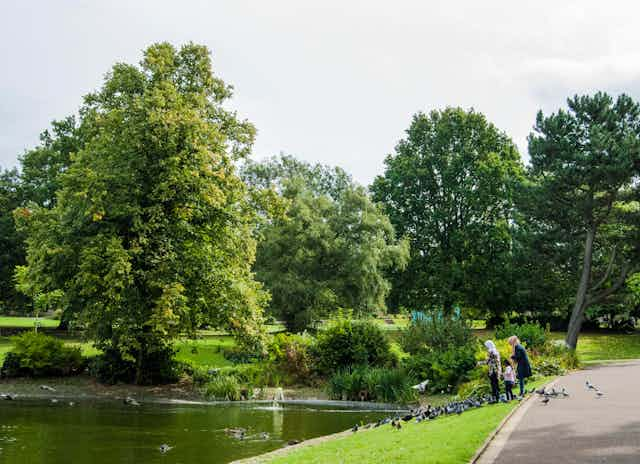Each year in the UK, the arrival of the summer’s first swifts on their perilous migrations from distant continents reminds us of the many other migratory journeys that pattern our modern world.
In cities, nature is rarely purely local – it’s been blown, flown, planted, colonised and renamed from elsewhere. Many humans in cities have similar histories. Having developed over many centuries, today’s urban population diversity in cities from London to Lahore is the result of a complex array of factors, including relocations, family ties, the need for refuge or the desire for a fresh start.
Research suggests that people who have moved to the UK from other countries, as well as people of colour, are often stereotyped as being detached from nature. Other more pressing concerns such as language capability, jobs, educational achievement and security are perceived as dominating the everyday lives of migrants, leaving little time for interest in the local flora and fauna.
But there are also deep rooted structural issues of unequal access to urban green spaces for people from lower-income neighbourhoods, which commonly have higher migrant populations.
By interviewing first-generation migrants of all ages living in Sheffield – from older people belonging to the Windrush generation to young refugees – we found that the full picture is far more complex than many assume. By listening to the nature stories of people who grew up in other countries, we not only understand how different people enjoy time spent outdoors, but we’re also able to expand our view of the value urban nature brings.
Captivated by British weather
Weather is a telling starting point. Understandably, some people from countries with hotter and more predictable climates can find British weather a bit of a challenge – since it doesn’t usually do what they might expect. But many of our interviewees talked positively about their fascination with the many variations of mist, drizzle, sunsets and snow the UK offers – like Hadil,* a middle-aged man originally from Sudan:
I love water here…every time when the rain is come, if I am inside the house I go outside and feel it in my face.

This kind of “weather-learning” was a typical behaviour displayed by our interviewees. Immersing themselves in nature involved smelling spring blossom, crunching autumn leaves, feeding squirrels and taking in distant views. For relative newcomers to the UK, engaging with these experiences reflected an openness to welcoming surprising forms of beauty in their everyday lives.
Time in nature, memories of family
While new nature experiences often provoked delight, the role of memory and connections with past landscapes formed some of the most powerful stories within our research.
In all parts of the world, children play in natural areas. These personal “nature histories” travel with us into our adult lives – sometimes into entirely different ecological landscapes. For first generation migrants in particular, we found that nature memories carried additional strength because they often emphasised connections with family elsewhere.
Farooq, a migrant from Pakistan, talked initially about how public services were being scaled back in his low-income neighbourhood, and how ill health effected his ability to socialise. He didn’t appear to have much time for or interest in nature. But then the discussion turned to his garden and the fruit trees he has planted. He spent many years learning how to graft mulberry trees as expertly as his uncle, still living in Pakistan, and enthusiastically discussed the high quality of the mulberry wood.
I used to love it…where I was during childhood…Pakistan, they have so many mulberry trees, every house they have two or three, four…“
Growing mulberry trees connected Farooq with his childhood and his family back home. And now, his new trees provide shade for his grandchildren playing in his Sheffield garden.

Idin arrived as an asylum seeker from Iran only a few months prior to the start of our research, but he had already established a habit of feeding a squirrel at his window ledge.
I don’t know if it’s right or wrong to give them food. I heard in this city that people don’t give animal foods…I need to read about it.
Idin explained how he always used to feed street cats in his home city. His mother would laugh at him for doing so, but tolerated his unusual behaviour. Stories like these preserve precious connections to migrants’ personal histories that help ease the turmoil of moving to the UK and the mental health challenges that can mark migrants’ lives.
Intergenerational connections
Migrants who are also parents valued Sheffield as a place to bring up their children, often because of the plentiful parks and nearby countryside. Some interviewees mentioned that, while out and about in the city, seeing a tree or view that reminded them of their home could prompt them to share stories of their own childhood. Their children sometimes teased them about these reminiscences.

Each summer, Helima visits a farm on the edge of Sheffield. She makes a point to seek out the strawberry beds. Picking strawberries with her children is a time for telling stories of her own childhood holidays at her grandparent’s farm in rural Algeria, providing a time and a place to experience intergenerational connections – despite being thousands of miles distant.
My granddad used the recipe for strawberry jam, how to bake it, so I show them how to make the the jam. It was good feeling to give them, to make them learn something different.
Our research uncovered nature stories among Sheffield residents who wouldn’t call themselves "nature enthusiasts”. In our global climate emergency, it is vital that we recognise and encourage the myriad of ways in which urban dwellers choose to connect with nature.
As we work to combat social inequalities around access to natural spaces, let’s celebrate the plurality of attitudes to the natural world like we celebrate the ever welcomed arrival of the swifts.
*All names have been changed to protect the individuals’ identities.

